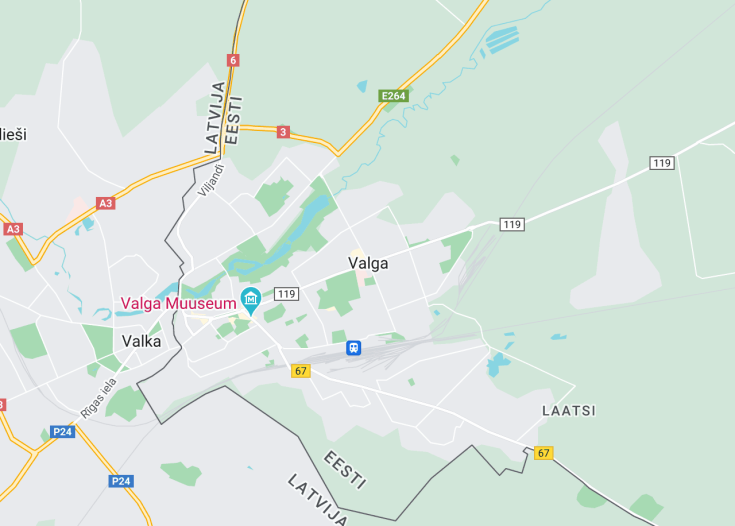Valga, nestled on the picturesque border between Estonia and Latvia, is a charming town that offers a unique exploration of cultural convergence. Its strategic position has shaped its history, visible in the town’s architecture and museums. Valga is ideal for travelers keen on experiencing a blend of Estonian and Latvian heritage amidst serene landscapes. The town promotes a peaceful escape with opportunities for various outdoor activities, including cycling and hiking along well-maintained trails that crisscross the border area.
Before traveling to Valga, consider visiting during the summer months, when the town’s cultural festivals and mild weather provide an enriching experience.
Make sure to explore the Valga Military History Museum to gain an insightful view into the region’s past, which plays a pivotal role in understanding its present cultural dynamics.
Top things to do & see in Valga
Select the following sights and activities to discover best tickets and tours available in Valga.
Valga: A Crossroad of Cultures
| Country | Estonia |
| Time in Valga | GMT+2 |
| Language spoken | Estonian |
| Population | 12,261 (Statistics Estonia, 2021) |
| Currency | Euro (EUR €) |
| Airports |
|
Valga, also known by some as Valka in Latvian, epitomizes a blend of cultures, traditions, and histories that converge at the border of Estonia and Latvia. This town, unique for being split by a national border, has an intricate history dating back to medieval times when it was a recognized mercantile city. Valga’s geographic positioning as a gateway between Estonia and Lativa has painted its past with various rulers and shifting boundaries, making its heritage rich and diverse.
Significantly impacted during the Second World War, the town was almost entirely rebuilt, which has resulted in a mix of architectural styles. Present-day Valga offers a quaint yet compelling mix of old and new, where historical churches and restored buildings stand near modern facilities. The Valga Museum of History and Art is a centerpiece of local culture and houses artifacts and exhibits that narrate the town’s compelling past.
The town also organizes numerous cultural festivals that bolster the unity between the Estonian and Latvian communities. Notably, the annual Valga Military History Festival attracts enthusiasts from across Europe, showcasing reenactments and exhibitions that highlight the region’s significant military past.
Apart from its rich history, Valga is surrounded by beautiful landscapes, offering various outdoor activities. The nearby Pedeli River is popular for kayaking and fishing, while the local parks and walking trails provide peaceful escape routes into nature.
Where is Valga?
Located in southern Estonia, Valga lies at the Estonian-Latvian border, making it coexistent with the town of Valka in Latvia.
Distances:
| Route | Distance by car | Time by car |
|---|---|---|
| Tallinn to Valga | 160 miles (257 km) | 3 hours 25 minutes |
| Tartu to Valga | 82 miles (132 km) | 1 hour 45 minutes |
What is Valga famous for?
Valga is celebrated for its unique position as a town divided by a national border, offering a unique cultural blend and a vibrant history that is showcased through its museums and annual festivals.
History
Prehistoric to Medieval Times
Valga, located in southern Estonia right at the Estonian-Latvian border, boasts a rich history tracing back to ancient times. Archaeological evidence such as tools and burial sites shows that the area was inhabited by Finno-Ugric tribes over thousands of years ago. By the medieval period, it became a notable trading point due to its strategic location, utilized by merchants traveling between Russian, German, and Baltic territories.
16th to 19th Century
In the 16th century, Valga witnessed significant developments such as the establishment of structured civil and military administration during the Livonian War. The town evolved through the Swedish and then the Russian rule in the 17th and 18th centuries, respectively. Under Russian domination, Valga emerged as a significant railway junction, facilitating further growth and integration into broader European networks. The 19th century marked a blossoming era for Valga, seeing advancements in education and culture, with the establishment of schools, libraries, and a theatre.
20th Century to Present
Valga’s 20th-century narrative is marked by the tumults of World War I and II, during which it faced extensive damage. However, the post-war period and Estonia’s regained independence in 1991 ushered in a phase of reconstruction and enhancement. Today, Valga constitutes an emblematic example of successful cross-border cooperation between Estonia and Latvia, offering a unique blend of two national traditions and cultures seamlessly coexisting.
Visit Valga
What to see and do in Valga, Estonia
Valga, a town rich in history and culture, offers a variety of attractions and activities. Visitors can explore the Valga Museum, which provides insights into the town’s fascinating history. The nearby military-themed park with historical monuments is a must-see for history enthusiasts. Nature lovers will appreciate the beautiful Pedeli river area, which is perfect for walking and cycling. Additionally, the town hosts several cultural festivals that showcase local traditions.
- Valga Museum
- Military-themed Park
- Pedeli River Area
- Local Cultural Festivals
Annual festivities in Valga
Valga is lively with cultural events throughout the year, particularly highlighting its rich Estonian and Latvian heritage. Key events include the Valga Military History Festival in the summer and the Valga/Valka Town Festival, which occurs at the beginning of June, celebrating the town’s birthday with music, crafts, and traditional foods.
Best time to visit Valga
The ideal time to visit Valga is during the warm summer months from June to August. This period offers the most pleasant weather for exploring the outdoors and participating in the town’s various summer events.
Is Valga worth visiting?
Valga is unquestionably worth a visit for those intrigued by history, culture, and nature. Its unique position as a border town enriches its cultural tapestry, making it a fascinating destination for those eager to experience a blend of Estonian and Latvian heritages. The well-preserved historical sites coupled with engaging local events and beautiful natural scenery make Valga a memorable destination.
















